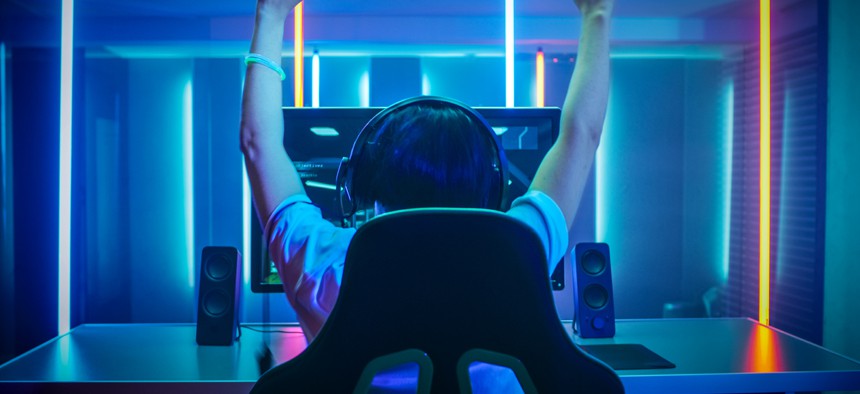From New Hampshire to California, Parks Departments Embrace Video Games

istock.com/gorodenkoff
Esports leagues, where gamers of all ages compete online in tournaments, are an increasingly popular programming choice for parks and recreation departments.
Typically, activities offered by parks and recreation departments involve swimming pools, tennis courts and soccer balls. But increasingly, they’re also including PlayStations, Xboxes and other gaming consoles.
That’s due to the rise of esports leagues, where video gamers of all ages compete head to head in tournaments, either virtually or in person. They’re an increasingly popular programming choice for parks and recreation departments around the country, from smaller cities (Goffstown, New Hampshire) and mid-sized markets (Elgin, Illinois) to large, urban centers (Dallas).
It’s unclear how many cities offer esports as official parks programming, according to the National Recreation and Park Association, which does not track the activity due to its relatively recent emergence among government agencies, said Rachel Banner, the organization’s director of parks access.
“Our park metrics—the data that tracks what agencies offer—hasn’t been updated to include esports, which is a good reflection of how new it is,” she said. “That said, it has been a frequent topic of conversation on our NRPA Connect Board, which is our networking platform for parks and rec professionals.”
The details of local government esports leagues vary across the country, but typically involve a partnership between an online gaming platform and the city, county or state parks agency. For example, the parks department in New Albany, Ohio, uses Discord for its esports tournaments, while Greensboro, North Carolina, is partnering with Mission Control for its new league.
The Greensboro league, which is registering players for its inaugural summer season, will feature three divisions (kids between the ages of 7 and 12, teens between the ages of 13 and 17, and adults 18 and up) and four games (Madden 21, NBA 2K21, Fortnite and Rocket League 2v2). Games will start this month on weeknights, though play will likely expand to weekends eventually, officials said.
The idea for the league solidified in the early days of the pandemic, when Covid forced the parks department to pause all in-person activities and programming, said Quentin Jones, director of the city’s Warnersville Recreation Center.
“Part of parks and recreation is finding your community and figuring out how to engage with them,” he said. “Because I worked in the rec center, I had a lot of kids and teens coming in, and I knew they played video games, because that’s all they talked about. Sometimes, my coaches would say they were playing online with the kids, so I was like, ‘This could be a great program to offer while people are at home.’”
Jones’ initial plan was to run the gaming league as a stand-in until traditional programs could resume. The city began with a few tournaments in the fall, with little marketing and a few dozen participants, mostly to gauge interest and see which age groups were more likely to participate. After that, parks officials sent out a survey, asking for feedback and information on whether participants would be interested in joining a formal league and which games they’d most like to play.
“That’s how we picked the games we’re offering now, but those games will change,” said Jacob Neal, operations supervisor for the Greensboro Department of Parks and Recreation. “One thing we kind of knew when we started was that we weren’t really going to know what the Greensboro community wants right off the bat.”
League play will be virtual for now, partially due to Covid, but also because of the high start-up costs of outfitting an in-person play area with gaming consoles, TVs, tables and controllers. It might have been possible, Neal said, but participation fees would have been much higher as a result (league members pay $10 for each five-week season tournament).
But virtual play limits participants to those who own gaming consoles, so the city hopes to offer in-person tournaments eventually, potentially with “teams” comprised of kids and adults representing different recreation centers. Still, virtual play can help foster connections, Neal said—between kids and their friends, adults who may not know each other, and for people who may not be interested in traditional sports, or those who aren’t physically able to play them.
“You’re in a league, and a lot of these people have never played in an actual league,” Jones said. “It’s just fostering connections that we’d normally do in person. It should feel the same, except that it’s online.”
Kate Elizabeth Queram is a senior reporter for Route Fifty and is based in Washington, D.C.
NEXT STORY: Why Getting More People with Disabilities Developing Technology is Good for Everyone





